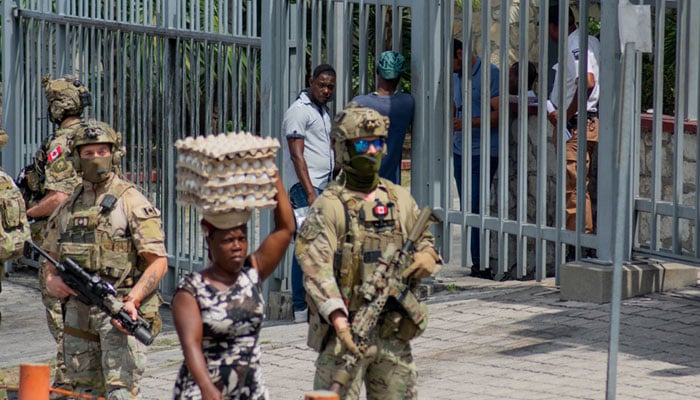Over 50,000 fled Haiti capital in three weeks
Prime Minister Ariel Henry was initially expected to be replaced within days of the announcement
PORT-AU-PRINCE: More than 53,000 people fled Haiti’s capital in just three weeks of March as conflict between powerful armed gangs wreaked havoc for civilians, with the state largely absent and a path out of the chaos yet to be established by politicians.
Tens of thousands of people left Port-au-Prince’s metropolitan area between March 8 and 27, according to United Nations estimates released on Tuesday, with violence again flaring up over the Easter weekend and at the start of April.
The UN Human Rights Chief Volker Turk said on Tuesday that a scale of human rights abuse was taking place “unprecedented in modern Haitian history,” including killings, kidnappings and sexual violence. The conflict has also blocked off transport of key goods and humanitarian aid into the capital.
According to the UN, many of the displaced are traveling toward the country’s southern peninsula, which is still recovering from a devastating 2021 earthquake. Nearly seven in 10 who left the capital in March had already been displaced by the gang violence, it said.
As nearby countries harden their maritime borders, just 4 percent said they wanted to emigrate, mostly to the Dominican Republic, which shares the island of Hispaniola with Haiti.
But a wary Dominican Republic government has boosted border security, ruled out refugee camps on its territory, and deported tens of thousands back across the border.
Alliances of powerful gangs are seeking to take over parts of the capital they do not yet control and have declared “war” on the de facto government, whose prime minister announced his resignation on March 11 while stranded in the United States.
Prime Minister Ariel Henry was initially expected to be replaced within days of the announcement, with a transitional presidential council formed by representatives of political parties and civil society groups put forward by regional leaders in Jamaica.
-
 'The Muppet Show' Star Miss Piggy Gives Fans THIS Advice
'The Muppet Show' Star Miss Piggy Gives Fans THIS Advice -
 Sarah Ferguson Concerned For Princess Eugenie, Beatrice Amid Epstein Scandal
Sarah Ferguson Concerned For Princess Eugenie, Beatrice Amid Epstein Scandal -
 Uber Enters Seven New European Markets In Major Food-delivery Expansion
Uber Enters Seven New European Markets In Major Food-delivery Expansion -
 Hollywood Fights Back Against Super-realistic AI Video Tool
Hollywood Fights Back Against Super-realistic AI Video Tool -
 Meghan Markle's Father Shares Fresh Health Update
Meghan Markle's Father Shares Fresh Health Update -
 Pentagon Threatens To Cut Ties With Anthropic Over AI Safeguards Dispute
Pentagon Threatens To Cut Ties With Anthropic Over AI Safeguards Dispute -
 Samsung Galaxy Unpacked 2026: What To Expect On February 25
Samsung Galaxy Unpacked 2026: What To Expect On February 25 -
 Travis Kelce Takes Hilarious Jab At Taylor Swift In Valentine’s Day Post
Travis Kelce Takes Hilarious Jab At Taylor Swift In Valentine’s Day Post -
 NASA Confirms Arrival Of SpaceX Crew-12 Astronauts At The International Space Station
NASA Confirms Arrival Of SpaceX Crew-12 Astronauts At The International Space Station -
 Can AI Bully Humans? Bot Publicly Criticises Engineer After Code Rejection
Can AI Bully Humans? Bot Publicly Criticises Engineer After Code Rejection -
 Search For Savannah Guthrie’s Abducted Mom Enters Unthinkable Phase
Search For Savannah Guthrie’s Abducted Mom Enters Unthinkable Phase -
 Imagine Dragons Star, Dan Reynolds Recalls 'frustrating' Diagnosis
Imagine Dragons Star, Dan Reynolds Recalls 'frustrating' Diagnosis -
 Steve Jobs Once Called Google Over Single Shade Of Yellow: Here’s Why
Steve Jobs Once Called Google Over Single Shade Of Yellow: Here’s Why -
 Barack Obama Addresses UFO Mystery: Aliens Are ‘real’ But Debunks Area 51 Conspiracy Theories
Barack Obama Addresses UFO Mystery: Aliens Are ‘real’ But Debunks Area 51 Conspiracy Theories -
 Selma Blair Explains Why Multiple Sclerosis 'isn't So Scary'
Selma Blair Explains Why Multiple Sclerosis 'isn't So Scary' -
 Will Smith Surprises Wife Jada Pinkett With Unusual Gift On Valentine's Day
Will Smith Surprises Wife Jada Pinkett With Unusual Gift On Valentine's Day




